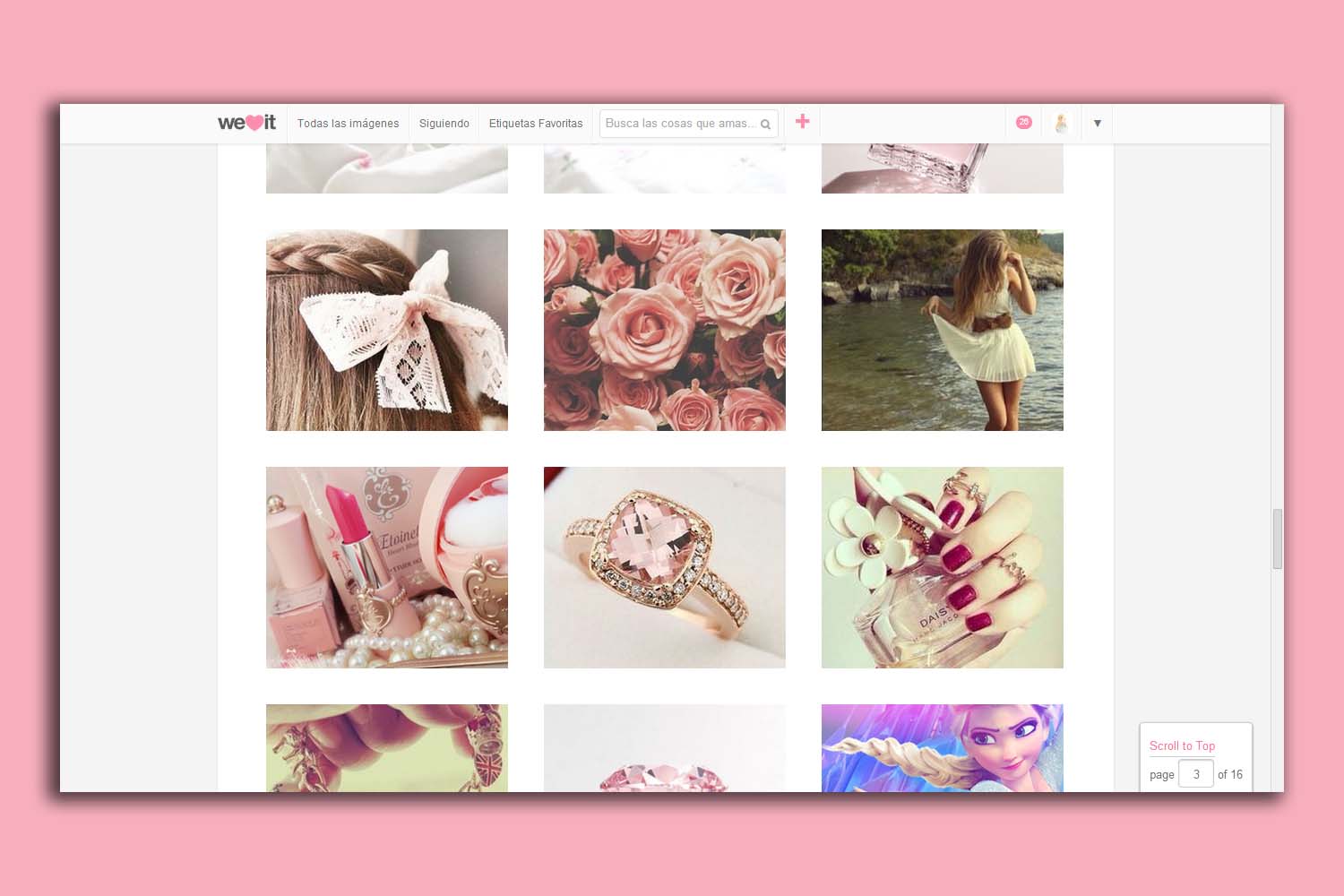Founded in 2008 by Brazilian native Fabio Giolito, We Heart It was a social media platform that became a global hub for image-based inspiration. It also ‘almost’ shared a name with another website closer to home.
Frustrated by the exclusivity of the then-popular FFFFOUND! website, Giolito sought to create an accessible space where users could ‘heart’ and share images with friends. What began as a personal project quickly grew into a thriving community, driven by organic user engagement and the simplicity of its visual curation model.
As the platform’s popularity soared, Giolito enlisted Bruno Zanchet as co-founder to strengthen the site’s technical infrastructure. By 2011, with the support of seed funding, We Heart It had evolved into a fully incorporated company, employing a team of 25 in San Francisco. Which is when we first discovered the likeness.
Registered as weheartstuff.co.uk on 1 October 2007 as a personal project from founder James Davidson, ‘We Heart Stuff’ quickly gathered pace as one of the few ‘cool hunter’ style websites around. Almost immediately regretting the ‘Stuff’, weheart.co.uk was registered that same month. What a shame, however, there wasn’t enough foresight to register weheart.com, which was snapped up on 25 March 2008; much later rebranding as a more globally focussed website, we-heart.com was purchased on 10 December 2012 after countless efforts to prize the hyphen-less version from the Californian company who have been inexplicably parking the domain for the last 16 years.
Following a further $8 million in Series A funding from White Oak and IDG Ventures in June 2013, the We Heart with an It on the end soared to success, with over 40 million registered users. We Heart would never achieve even a glimmer of those figures, but is still here to tell the tale. We Heart It on the other hand?

What Happened to We Heart It?
We Heart It, the social media platform launched in 2008, once thrived as a haven for young users seeking visual inspiration through curated image collections. Its simplicity and positive community drew comparisons to Pinterest and Tumblr, and by 2013, the site boasted over 20 million monthly users, with a predominantly young, female audience. The platform allowed users to “heart” images, organize them into collections, and connect with others over shared aesthetics in categories like fashion, beauty, and art.
However, We Heart It’s growth began to slow as competition increased from larger platforms like Instagram. Despite adapting features like mobile apps and even incorporating written articles and podcasts to diversify content, the platform struggled to maintain its user base .
By 2023, We Heart It made the notable decision to remove the ability for users to upload new photos via its app, shifting the focus to downloading previously saved content through its website. This move reflected the platform’s shrinking activity and a pivot towards archiving rather than fostering new user-generated content. While We Heart It still operates and retains a loyal user base, its active community has dwindled significantly, with many users turning to more dynamic platforms.
What Happened in the We Heart It Data Breach?
In October 2017, We Heart It confirmed a major data breach affecting over 8 million user accounts. The breach involved user information dating back to 2013, which included email addresses, usernames, and encrypted passwords. While no financial information was compromised, the nature of the breach raised concerns about the security of personal data stored on the platform.
The breach was attributed to unauthorised access by attackers who managed to exploit vulnerabilities in We Heart It’s systems. The company responded by urging all users to reset their passwords, especially if they reused the same passwords on other platforms. At the time, We Heart It used outdated encryption methods, which led to further concerns about the effectiveness of their data protection measures.
In response, We Heart It pledged to enhance security measures by upgrading encryption protocols and implementing more robust security features to prevent future incidents. The breach served as a wake-up call for many users about the importance of using unique passwords across different platforms.

The Decline of We Heart It
In discussing the broader demise of We Heart It, it would be helpful to explore a few key aspects:
Shift in Social Media Trends
The platform’s decline can largely be attributed to the evolving nature of social media. As visual-first platforms like Instagram and TikTok surged in popularity, users began favouring apps that offered more interactive and dynamic content, such as short-form videos and live interaction. We Heart It, which focused primarily on static images and collections, struggled to keep up with this shift.
Failure to Innovate
Although We Heart It introduced features like articles, podcasts, and messaging, these updates were often seen as too little, too late. Competitors like Instagram were consistently pushing the envelope with new features like Stories, Reels, and live content, making We Heart It’s slower innovation cycle a disadvantage.
User Fatigue and Decline in Engagement
By the late 2010s, many users reported a decline in engagement on the platform. This led to fewer content creators actively using the site, which in turn diminished the quality of user-generated content. Once a platform loses its active base of creators, it becomes challenging to attract and retain a large user community.
Monetisation Issues
While We Heart It did incorporate ads and pursued revenue through mobile advertising, it struggled to effectively monetise its platform in the same way as larger competitors. This likely contributed to the platform’s inability to scale effectively and maintain its infrastructure.
The 2017 Data Breach
The platform’s reputation took a hit after the 2017 data breach, which affected millions of users. Though no financial data was compromised, the delayed disclosure eroded trust among its users, further accelerating its decline.
In conclusion, the combination of changing user behaviour, stronger competition, slow innovation, and security issues ultimately led to We Heart It’s diminished relevance in the social media landscape today.
What to Use Instead of “We Heart It?”
If you’re looking for alternatives to We Heart It, several platforms offer similar features for curating and sharing visual content. Here are a few popular options:
Pinterest: Pinterest is a well-known alternative that allows users to “pin” images and organise them into themed boards. It’s widely used for discovering ideas across various categories such as fashion, home décor, and DIY projects. With a robust search function and an engaged community, Pinterest remains a leading platform for visual inspiration.
Tumblr: Tumblr is another platform that closely resembles We Heart It, offering a mixture of text, images, and GIFs. Users can customise their blogs, reblog content, and follow others, creating a vibrant community for niche interests and aesthetics. Tumblr’s flexibility and social interaction make it a great alternative for creative expression.
Instagram: While primarily a social media platform, Instagram allows users to curate their feeds with visual content and connect with communities based on shared interests. With features like Stories, Reels, and Explore pages, it’s ideal for discovering and sharing aesthetic images.
VSCO: VSCO is popular among photographers and visual creators for its sleek design and high-quality photo-editing tools. Users can create portfolios of their work, follow other creators, and enjoy a minimalist, ad-free experience. It’s a great platform for those focused on photography and digital art.
These platforms all offer a space for visual discovery, creativity, and inspiration, making them strong alternatives to We Heart It.








